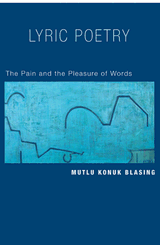
BLASING, Mutlu Konuk, Lyric Poetry: The Pain and the Pleasure of Words, Princeton University Press, 2006, 232 pp.
ISBN: 0-691-12682-8
Lyric poetry has long been regarded as the intensely private, emotional expression of individuals, powerful precisely because it draws readers into personal worlds. But who, exactly, is the "I" in a lyric poem, and how is it created? In Lyric Poetry, Mutlu Blasing argues that the individual in a lyric is only a virtual entity and that lyric poetry takes its power from the public, emotional power of language itself.
In the first major new theory of the lyric to be put forward in decades, Blasing proposes that lyric poetry is a public discourse deeply rooted in the mother tongue. She looks to poetic, linguistic, and psychoanalytic theory to help unravel the intricate historical processes that generate speaking subjects, and concludes that lyric forms convey both personal and communal emotional histories in language. Focusing on the work of such diverse twentieth-century American poets as T. S. Eliot, Ezra Pound, Wallace Stevens, and Anne Sexton, Blasing demonstrates the ways that the lyric "I" speaks, from first to last, as a creation of poetic language.
Mutlu Konuk Blasing is Professor of English at Brown University. She is the author of The Art of Life, American Poetry, and Politics and Form in Postmodern Poetry.
Acknowledgments ix
Introduction: "Making Choice of a Human Self" 1
PART ONE: Lyric Theory
Chapter 1: The Lyric Subject 27
Chapter 2: The Historical "I" 45
Chapter 3: The Scripted "I" 78
Chapter 4: The Body of Words 96
PART TWO: Lyric Practice
Chapter 5: Four Quartets: Rhetoric Redeemed 115
Chapter 6: Wallace Stevens and "The Less Legible Meanings of Sounds" 133
Chapter 7: Pound's Soundtrack: "Reading Cantos for What Is on the Page" 149
Chapter 8: Anne Sexton, "The Typo" 178